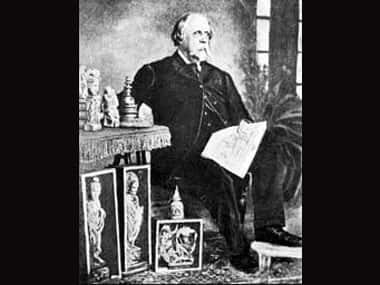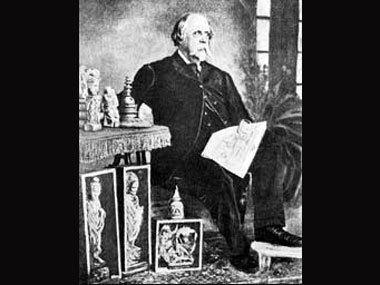By Sulekha Nair In the mid-19th century, a young British officer arrived in India as a 19-year-old to work with the Bengal Engineers and participate in the military campaigns of the East India Company. But as it turned out, that officer would be forever remembered for a lot more than his military prowess. That officer was Sir Alexander Cunningham (1814-1893), the founder of the Archaeological Survey of India (ASI), the man India’s historians and history lovers should thank, but have probably forgotten. [caption id=“attachment_1403877” align=“alignleft” width=“380”]  A file photo of Sir Alexander Cunningham. Image courtesy: Archaeological Survey of India website[/caption] Sir Cunningham, the man who wrote volumes of archaeological survey reports of the ASI, does not get even a commemorative note for his bicentenary on the ASI website. When this writer asked a senior official at the ASI as to why the bicentenary of its founder does not find a mention on its website, the bureaucrat remarked, “You need to ask that question to the Ministry of Culture.” “That should not be surprising,” remarked Dr AP Jamkhedkar, scholar, archaeologist and former director of Archaeology and Museums for Maharashtra State. “We have apathy towards everything,” he says, adding, “When you have a bureaucrat (civil servant) in charge of a department, instead of a professional, what can you expect?” An opportunity lost perhaps to recall the history of the ASI, call attention to the many timeless monuments in the country, and thus give a leg-up to tourism. A keen Indologist Cunningham was an enterprising engineer who took great interest in the culture of India, even as he served in the British army from where he eventually retired as the Major General. It was a chance meeting with James Princep, the celebrated epigraphist, which really sparked off his career as an Indologist. Princep had deciphered ancient Asian scripts - Kharoshti and Brahmi - and his knowledge of numismatics was widely known and recorded. Cunningham’s close friendship with Princep kindled his passion for Indian art, architecture and numismatics, and pushed him to conserve and celebrate ancient Indian monuments and their histories, which lay forgotten in ruins. Cunningham’s work was truly visionary as he did not have any historical data to use as a base for his research in India, Jamkhedkar pointed out. Instead, Cunningham relied on Chinese pilgrims Fa-hien and Hsuan-tsang’s travelogues of India and traced the latter’s route through the country to discover important historical sites. “His knowledge of numismatics, epigraphy and archaeology helped him study Indian culture from those points of view, too. His work on Indian archaeology is fundamental and seminal,” reiterates Jamkhedkar. Cunningham was responsible for the excavation, exploration and preservation of several monuments of North India, including Sarnath, Sanchi, the Mahabodhi temple at Bodh Gaya, the Dashavatar Temple at Deogarh, amongst others. Today, some of these sites have been accorded World Heritage status and are a major source of revenue for tourism in India. It was in November 1861, after his retirement from the army, that Cunningham sent a memorandum to Lord Charles John Canning, then Viceroy of India, recommending the establishment of the Archaeological Survey of India. Lord Canning agreed and appointed Cunningham the first Director of the ASI in 1861. Not forgotten amongst scholars Luckily, all has not been forgotten about Cunningham. The ASI has undertaken a tokenistic exercise in commemorating its founder: it is funding the Department of History of Art at the Benares Hindu University (BHU), Varanasi, to conduct a three-day seminar in February, focusing on ‘Advances in Science and Technology after Cunningham and their Implications in the Study of Indian Art and Archaeology.’ When this writer contacted the ASI’s Director General, Dr Pravin Srivastav, about its tie-up with the BHU, Srivastav said that he did not recall the `exact amount’ of funds given for the seminar to commemorate its founder. But he promised to reply to an email after looking through the files. Though an email was received, details about the funds or how they were being deployed were not revealed. The BHU, on its part, has invited as many as 125 scholars to present various papers, and Prof Atul Tripathi, organising secretary of the seminar at BHU, said one French scholar is attending the international seminar. Tripathi was cagey about divulging details of the funds given to it by the ASI, suggesting we ask the ASI about it. He chose to focus attention on the seminar, which he says is being held to explore the possibility of an interdisciplinary dialogue between archaeology, geography, history, etc, with regard to Cunningham’s work and look at how it can be taken forward in the 21st century. “When Sir Cunningham explored and excavated the sites, science and technology was not advanced as it is today.” Archaeologists need to share the blame Without any funding from the ASI, the Mumbai University’s Department of Pali has been taking the initiative to acknowledge Cunningham and his work for the past three years. “We have to be grateful for what he has done for not just history and archaeology but for almost every branch of studies on India’s history,” emphasised Dr Yojana Bhagat, coordinator. To coincide with the 200th birth year of Cunningham, the Pali department held a series of three lectures on his contribution to Indian archaeology and history in January. “Thanks to Sir Cunningham, we have no confusion regarding the names of important historical sites in India. Since he was interested in Pali literature, he was able to identify even minor sites such a river in Kosambi,” Dr Bhagat explained. VS Shinde, Professor of Archaeology and Joint Director of Deccan College, Pune, has a different take on the issue and emphasised that while the government has been found napping on recognising the efforts of Sir Cunningham, the archaeologists in the country should also take the blame. The enthusiasm and zeal that Cunningham displayed is found wanting in the archaeological community today, he opined. “Archaeologists have failed in their duty by not raising their voice about the state of archaeology and the condition of some of our sites in India.”
This month marks the 200th birth anniversary of Sir Alexander Cunningham, founder of the Archaeological Survey of India. But few events have been planned to commemorate this pioneer
Advertisement
End of Article
Written by FP Archives
see more


)

)
)
)
)
)
)
)
)



